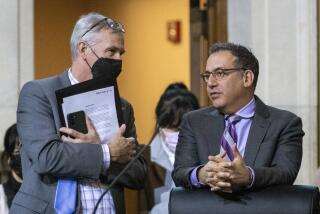Expected Budget Shortfall Adds to Money Woes : * Finances: Revenues for 1992-93 projected at $1.4 million less than needed. Officials consider options to ease financial problems, including layoffs.
- Share via
In October, South Gate voters opposed to gambling dealt the City Council a fiscal setback by rejecting a card casino and entertainment complex that officials had hoped would garner the financially strapped city $7 million a year.
Last week, the council got bad news about its general fund budget, which pays for most of the city’s essential services, including police, parks and recreation, and street maintenance.
“What I have is not good news,” said City Manager Todd Argow as he forecast a $1.4-million revenue shortfall in the 1992-93 fiscal year if existing levels of services are maintained. South Gate’s general fund budget for the current fiscal year is $19.6 million.
Argow said the revenue picture this year is also bleak, based on first-quarter figures. They show revenues 27% below what was projected and 11% lower than during the comparable period last year.
However, Argow said the impact of the revenue drop was softened by a $1.4-million reserve carried over from the previous fiscal year and by a $2.9-million sale of air-pollution-reduction credits, which were acquired from General Motors after it closed its South Gate auto assembly plant in 1980. The city had planned to use them as an incentive for redevelopment of the old General Motors site, which is still partially vacant.
However, Argow said the proceeds from the sale were one-time-only revenue. He cautioned that using it “to offset operating expenses is postponing coming to grips with a financial crisis which only grows larger the longer the city relies on asset revenue to balance its budget.”
Said Mayor Gregory Slaughter: “There are no more white rabbits in the hat to quietly balance the budget. We have to start deciding what we’re going to do. The economic downturn is well documented.”
Councilman Larry Leonard immediately proposed a $1.5-million reduction in this year’s budget, getting quick support from council members Robert Philipp and Mary Ann Buckles. The council did not discuss possible cuts in detail, but staff layoffs and reductions in parks and recreation programs and public works were mentioned. Cuts in police services, which account for more than half of the general fund budget, also could be made.
For his part, Leonard said the reduction could be accomplished by putting city government on a four-day, 36-hour workweek. But he said he has no support for that concept from the rest of the council.
The council has asked the public for ideas about how to solve the city’s financial problems, but there were few speakers at last week’s council session.
One man seconded Leonard’s four-day workweek proposal, and there were suggestions that South Gate attract a major hotel or a sports arena. However, Slaughter noted that “no one wants to build (a sports arena) in South Gate.”
The council has asked for more public testimony at its next meeting on Nov. 25.
Slaughter said after last week’s session that the council will give instructions to Argow at the next meeting about steps to take to deal with the budget situation. The council already has started raising fees to cover the costs of some city services.
South Gate’s financial decline dates from the late 1970s, when longtime major employers began leaving the blue-collar factory town, which now has an 83% Latino population.
The losses included General Motors, Weiser Lock, and the Firestone Tire and Rubber Co. At the time of their closings, the three employed a total of 8,590 people, according to a city report.
City sales tax revenue took a pounding in February when the auto sales slump prompted Pete Ellis to close four dealerships that produced $700,000 in city sales taxes each year. Two weeks later, Freedom Ford, which accounted for $350,000 in sales tax, also went out of business.
Argow said the city was “virtually bankrupt” by the end of February and had to cut $742,311 from the 1990-91 budget.
In an earlier interview, Argow said the council’s choice is between finding new sources of revenue or making major cutbacks on top of service curtailments already implemented, such as putting off major street repairs.
“We’re looking at everything that’s possible out there,” he said. “Unfortunately, we have to rely on the private sector to respond to our overtures. We just can’t go out to a developer and say ‘Hey, you, build a shopping center.’ ”
With the failure of the card club proposal at the polls, the city has asked the general partner in the project to determine whether the entertainment complex with a hotel, restaurants, banquet facilities, retail shops and a health spa is feasible without gambling.
More to Read
Sign up for Essential California
The most important California stories and recommendations in your inbox every morning.
You may occasionally receive promotional content from the Los Angeles Times.










